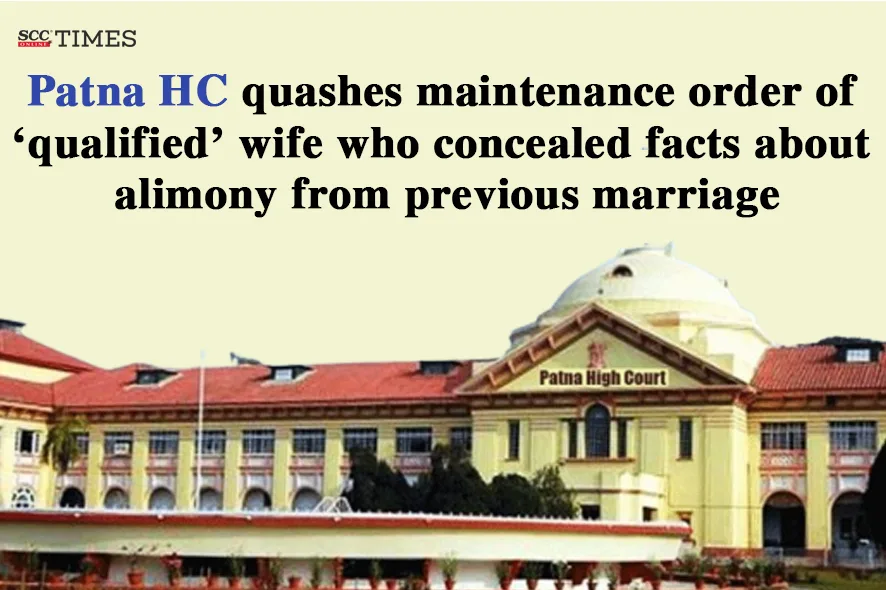Patna High Court: In a criminal revision petition filed by the petitioner challenging a final order of maintenance passed by the learned Principal Judge, Family Court, a Single-Judge Bench of Bibek Chaudhuri, J., while quashing and setting aside the maintenance order, held that the trial court failed to consider suppression of material facts, income of the parties, their source of income, their assets and liabilities and other similar factors, which are required to be considered for determination of maintenance allowance.
Background
The instant petition was filed by the petitioner challenging an order dated 24-05-2024, which directed him to pay maintenance allowance of Rs. 20,000/- per month to the respondent. The petitioner and the respondent met through a matrimonial site, and it was the respondent’s second marriage after her divorce. According to the petitioner, at the time of the dissolution of her first marriage, she had received a final settlement of Rs. 40 lakhs as alimony and had an independent source and sufficient means to maintain herself.
Contentions
The petitioner alleged that the respondent has a habit of duping young men to earn large sums of money through alimony or maintenance. The petitioner further contended that the respondent suppressed her previous marriage and swore an affidavit at the time of her marriage with the petitioner declaring herself to be unmarried, thus marrying him by fraud. It was also alleged that the respondent earns considerable interest per month from the alimony money and is academically qualified, having M.Sc. degree in Botany. She is also a diploma holder in Japanese language and can earn money not only for her livelihood but a decent sum to run a luxurious life. Further, the respondent refused to cohabit with the petitioner, abused his parents and is suffering from obsessive compulsive disorder (OCD) leading to suicidal tendencies.
The respondent in her counter-affidavit, denied the allegations and claimed that she had delivered the entire Rs. 40 lakhs to the petitioner on his demand. She further alleged that the petitioner demanded dowry of Rs. 15 lakhs and subjected her to physical and mental torture, which led to an abortion. She filed an application under Section 125 of the Criminal Procedure Code, 1973 (‘CrPC’) on 09-03-2021. Subsequently, she lodged a complaint under Sections 498A, 315, and 34 of the Penal Code, 1860 (‘IPC’) and Sections 3 and 4 of the Dowry Prohibition Act on 18-02-2022, after which the petitioner was arrested.
Analysis and Decision
The Court noted that in Rajnesh v. Neha, (2021) 2 SCC 324, the Supreme Court had held that maintenance claims require disclosure affidavits of assets and liabilities, balanced assessment of needs and quantum based on factors like parties’ status, reasonable need and income. The Court also noted that in Deb Narayan Halder v. Anushree Halder, (2003) 11 SCC 303, it was held that a wife who deserts her husband without sufficient reason or fails to prove cruelty is not entitled to maintenance. The Court observed that the respondent’s allegations of torture and dowry demand to lack specificity and credibility due to the unexplained 16-month delay in filing the complaint.
The Court further considered the Supreme Court’s decision in Jasbir Kaur Sehgal v. Distt. Judge, Dehradun, (1997) 7 SCC 7, which stressed the importance of considering the wife’s income or earning capacity in determining the quantum of maintenance. The Court observed that the respondent, despite being qualified, claimed to have no income and suppressed the Rs. 40 lakhs alimony she received from her previous marriage in her marriage affidavit. The trial court’s disbelief in her claim of handing over the cash to the petitioner suggested she still retained the funds, which would enable her to be self-sufficient.
The Court emphasized that the amount of maintenance fixed should be such that the wife can live in reasonable comfort but also that her own potential earnings and assets should be factored in. The Court referring to S.P. Chengalvaraya Naidu v. Jagannath, (1994) 1 SCC 1, noted that,
“While Section 125 proceedings are summary, courts consider conduct and financial disclosures critically. If a wife conceals her actual income or alimony, it may disentitle her as the court relies on bona fide disclosures to decide maintenance amount.”
The Court noted that Jaspreet Singh v. Gurleen Kaur, 2020 SCC OnLine P&H 55, emphasized the importance of following best practices like furnishing affidavits of assets and liabilities to prevent parties from concealing their income and resources.
The Court observed that before passing a final order of maintenance courts are under statutory obligation to direct the parties to file affidavits of assets and liabilities. Only on due consideration of such affidavits of assets and liabilities, it will be possible for the courts to consider the status of the parties, their assets, respective needs, capability of earning and based on such documents, courts can come to a conclusive decision regarding amount of maintenance.
In light of the afore-stated reasons, the Court concluded that the maintenance order dated 24-05-2024 suffers from impropriety and illegality in overlooking suppression of material facts, income of the parties, their source of income, their assets and liabilities and other similar factors, which are required to be considered for determination of maintenance allowance.
The Court set aside the maintenance order and directed the Family Court to re-adjudicate the matter by first directing both parties to file affidavits of their assets and liabilities and then pass a fresh judgment within four weeks.
[Ravi Prakash Saxena v. Priyanka Rani, 2025 SCC OnLine Pat 2793, decided on 04-09-2025]
Advocates who appeared in this case:
For the Petitioner: Amit Mallick, Advocate
For the Respondent: Shweta Priya, APP




